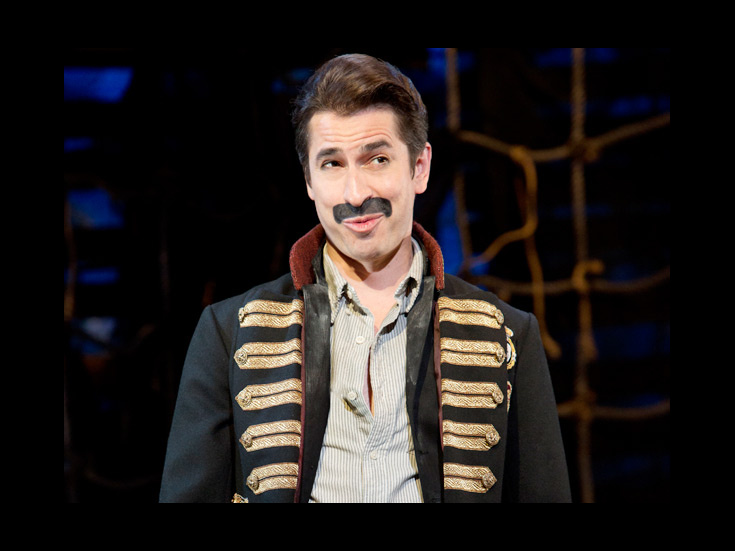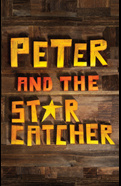Matthew Saldivar on His Big Broadway Year, from Streetcar to Peter and the Starcatcher
 Matthew Saldivar in 'Peter and the Starcatcher'
Broadway audiences have seen the funny side of Matthew Saldivar as Sammy in The Wedding Singer, Kenickie in Grease and now Black Stache in Peter and the Starcatcher, which he joined directly from playing Eunice’s husband Steve in the Broadway revival of A Streetcar Named Desire. Saldivar spent a decade performing the classics before his comic turn in The Wedding Singer made people start thinking of him as a “musical guy.” The versatile actor recently chatted with Broadway.com about the challenge of replacing Tony winner Christian Borle, why Streetcar deserved more love from the critics and the career advice he got from his grandmother.
Matthew Saldivar in 'Peter and the Starcatcher'
Broadway audiences have seen the funny side of Matthew Saldivar as Sammy in The Wedding Singer, Kenickie in Grease and now Black Stache in Peter and the Starcatcher, which he joined directly from playing Eunice’s husband Steve in the Broadway revival of A Streetcar Named Desire. Saldivar spent a decade performing the classics before his comic turn in The Wedding Singer made people start thinking of him as a “musical guy.” The versatile actor recently chatted with Broadway.com about the challenge of replacing Tony winner Christian Borle, why Streetcar deserved more love from the critics and the career advice he got from his grandmother.
What a year you’ve having, jumping from Streetcar to Peter and the Starcatcher!
It’s certainly a first for me—moving three blocks from one Broadway house to another, and two extraordinary pieces of theater. It happened so quickly, and there was a tremendous amount of work involved, so it’s kind of hard to process how fortunate I am.
You were performing Tennessee Williams while rehearing to play Black Stache?
Yes, it was a pretty intense couple of weeks. Everyone at Streetcar was very, very gracious and supportive. I wanted to stay as long as I could, but [the producers] wanted to put me in Peter as quickly as possible.
Peter and the Starcatcher is an intricate show. What’s it been like to join this ensemble?
Well, I watched the show for the first time the day I was offered the job. [During auditions] I had just been working off the script and own my understanding of it. When I saw the production, I had to employ all of my stoic reserve not to have a panic attack [laughs]. It’s such a wonderful piece of theatrical craft: Your eye is directed to certain places, and you don’t quite know how the actors on stage made those things happen. I’ve been doing it for just over a week now, and I no longer feel abject terror before making an entrance.
According to Page Six, you made Mad Men star Jon Hamm cry.
I heard! That was my first performance, which was my third or fourth run-through of the play with other people. It was a whirlwind of an evening, and a wonderful surprise to meet him afterwards because I admire his work very much. He’s a very nice person, and he said he was blown away by the piece.
So, how daunting was it to replace the actor who just won a Tony for the part you’re playing?
I was watching the Tonys while preparing for my final callback, marching around my apartment painting the walls to have another activity. I watched Christian walk up there and accept the award and [I took] a kind of a stoic approach, which was: What are my choices here? To freak out? To be intimidated by that? There’s no way to approach it except to work with integrity and with joy and do the best you can. I saw his performance a number of times, and he was absolutely wonderful. As any poet knows, you steal from the best and then you try to make things your own.
What’s your take on the character of Black Stache?
He loves being a villain, but being a villain surrounded by his ship of fools is not very satisfying. It is only when he meets Peter and begins being foiled by Peter that he becomes who he really wants to be—which is the complete villain.
The show is such a crowd pleaser.
It’s wonderful. You greet people afterward, all different ages, and they love it. There’s a lot of joy and laughter, but it’s also a very moving story of people growing into themselves and discovering what they want to be. This is a piece where the actors come out there at the top of the show and work hard until the end to produce this piece of theater. It’s a kinetic experience for the audience and I’m proud to be part of it.
Getting back to Streetcar for a second, were you surprised it didn’t get more critical recognition?
I thought it was an excellent revival, and I don’t think it was treated with enough respect. When you revive a classic piece of literature, there are a number of questions people ask, like, why now? This production implicitly demanded that people examine the play with fresh eyes and fresh ears, because of race. Period. Many people told me they had never really heard the play before—they never knew what a pistol Blanche is, and how smart and funny she is. I think what this revival did was shake off some of the preciousness about the play. Yes, it’s a tragedy, but there’s so much more life that exists within the play. You meet these people and observe how they behave with one another, and you get taken on a ride.
You’ve done broad comic roles in Broadway musicals, but also a lot of classic plays. How did that split focus come about?
For 10 years, I did off-Broadway and regional theater, a lot of classics and new plays. I was also in a downtown band [the Petersons] that was a theater troupe; we would write and perform 90-minute cabaret shows. That was how my colleagues knew me, as a downtown Shakespeare guy. And then, probably because I was in a band, I got this break to go to Broadway in The Wedding Singer. Five years later, people were like, “Oh, he’s a musical guy.” My job before [Streetcar] was at the Shakespeare Theater in DC, doing Much Ado About Nothing. My wife in that play, Amelia Campbell, told me, “My agent said you’re a big musical guy.” I thought that was funny.
Speaking of musicals, did you enjoy going on the road as Luther Billis in South Pacific?
That was just an incredible experience. It was an absolutely splendid production of a great American musical. [Tony winner] Bart Sher redirected the show, and he said on the first day, “No one should be bound by the characterizations you might have seen at Lincoln Center; we’re going to build this show again.” Danny Burstein did a fantastic job, but I’m not a Danny Burstein type, so I was allowed to develop the character and personalize it.
You were in your mid-30s when you made it to Broadway. Has your career gone the way you expected?
I really didn’t know what to expect. But some wise people told me in graduate school [at NYU] that it’s not a sprint, it’s a marathon, and that’s proven to be true. Things happen to you because you keep on working. My grandmother, who passed away last summer and who I loved very much, used to say to me when I was a kid, “You see that star off in the distance? You shoot for that star. You might not end up exactly at that star, but you’ll end up somewhere close to it and you’ll discover something there.” That’s kind of what it’s been like for me. I continue to get opportunities I never could have expected.
This interview has been more serious than fans of your comic roles would expect!
Everyone always asks, “Are you having fun? Are you having fun?” And yes, I do have fun, but only after I've done a lot of hard work. What we do as actors is not frivolous. For me, caring about something makes it fun.
See Matthew Saldivar in Peter and the Starcatcher at the Brooks Atkinson Theatre.

